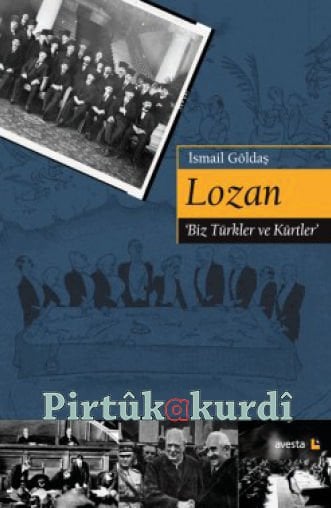Last remaining product:
0

Lausanne 'We Turks and Kurds'
(0) Comment - 0 Point
Category
Author
Stock
0 Piece
Stock code
AVESTA0174
stock status
Out of stock
Publishers
Price
0,70 USD + VAT
*starting from 0,10 USD!
%20 discount
0,70 USD
0,56 USD
- “…In our speeches in Lausanne; "We defended our national causes as a nation called 'we Turks and Kurds' and had them accepted."
İsmet İnönü
“The Turkish Grand National Assembly Government is the government of the Kurds as well as the Turks; because the legitimate representatives of the Kurds have entered the National Assembly and participate in the government and administration of the country to the same extent as the Turkish representatives.”
Mustafa Kemal
The Kurds, whose existence was denied and whose language was banned in the thirties, were, in the words of the then Prime Minister Rauf Bey, "a noble nation" during the Lausanne days. İsmet İnönü, who attended the Lausanne Conference as the chairman of the Turkish Executive Committee and was a "Kurd from Bitlis", said at the conference; He used the words "a superior lineage like the Kurdish lineage" knowingly and selectively. İnönü's "noble people" would be known as "Mountain Turks" a few years later.
This study provides a "reminder" of the Lausanne period by providing meeting minutes. While the author clarifies that there is no Kurdish representation in Lausanne, he clarifies the discussions in recent years that the Lausanne text should be "re-read" and that the articles regulating the "protection of minorities" should also be applied to Kurds.
Lausanne
The name of the book published by 'Avesta' publications by İsmail Göldaş, who works on recent Kurdish history and Turkey's recent political history: ' Lausanne / We Turks and Kurds'. The book, which is a review, deals with the period from the election of the Lausanne Delegate Board to the approval of the agreement. The defining feature of the book is that it deals with the Kurdish phenomenon within the framework of Lausanne. With the author's approach, we see the process of 'Necip Millet' in Lausanne becoming a 'Mountain Turk'.
Mehmet Ali Birand, Posta Newspaper, 01.10.2000
| Publisher | : | Avesta Publications |
| Number of pages | : | 260 |
| The heart | : | Turkish |
Be the first to review this product!
Kürtler için yapılmış güzel şeylerden bir tanesi
M... A... | 16/04/2025
siparişler hızlıca ulaşıyor, kategori çok. beğendim.
A... U... | 05/04/2025
Sizlerden gayet memnunum emeğinize sağlık
M... A... | 12/03/2025
Harikaydı
Serdar KÖMÜRCÜ | 22/01/2025
Gayet pratik ve hoş
Muzaffer Bora | 12/01/2025
Hızlı teslimat sağlandı .çok iyi bir şekilde bantlanmış teşekkürler. Gayet memnunum. Xwedê we bihêle .
A... Y... | 11/01/2025
&ddjmsd
RODEM ÇAÇAN | 06/01/2025
Sizi seviyorum Pırtukakurdi
Birsen KORKMAZ | 11/12/2024
Berbat
Sema Koç Soğancı | 29/11/2024
İsim yazılı kupa istedim kupada isim yok
F... D... | 09/11/2024


